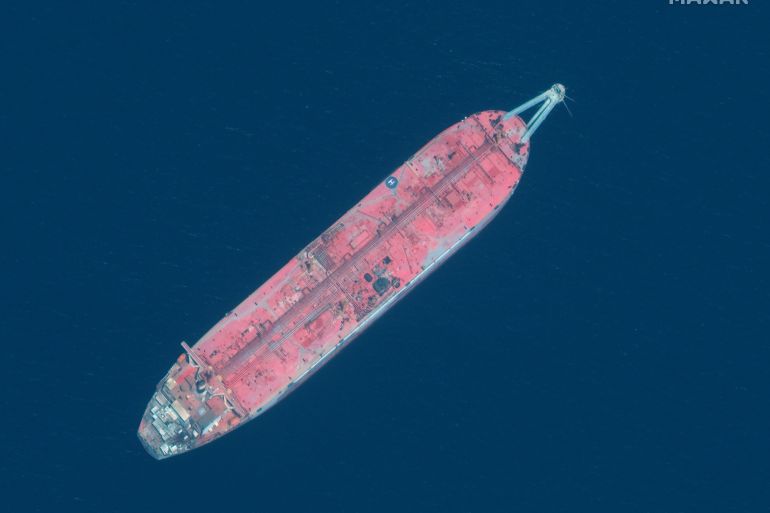‘Looming disaster’: Oil ship leak threatens millions of Yemenis
Houthi rebels have been accused by opponents of delaying a solution to the stricken oil tanker crisis in an attempt to gain politically.

An oil spill involving a deteriorating tanker moored off the coast of Yemen could potentially disrupt food and water supplies for millions of people in the conflict-ridden country, as well as further afield, in an environmental catastrophe that would be felt across the region.
A team of researchers from Stanford University, Harvard University, and UC Berkeley released the findings of their models on the impact of an oil spill from the FSO Safer in a paper published on Monday in the Nature Sustainability journal.
Keep reading
list of 4 itemsUN warns of Yemen famine; no aid from Saudis, UAE, Kuwait
Can an environmental catastrophe in Yemen be averted?
Yemen’s Houthi rebels agree to give UN access to abandoned tanker
The researchers stressed urgent action was required to stop a “looming disaster” that would affect an estimated nine million people who would be without drinking water, and shut down Yemen’s main ports, thereby worsening the country’s humanitarian crisis.
About 68 percent of humanitarian aid to Yemen enters through the ports of Hodeidah and Salif, which lie near to the stricken Safer, and more than half of Yemen’s population depends on humanitarian aid.
“The spill and its potentially disastrous impacts remain entirely preventable through offloading the oil,” the study said.
Four times Exxon Valdez
FSO Safer has not been maintained since the start of the conflict in Yemen in 2015, and negotiations between the United Nations and Yemen’s Houthi rebels, who control the ship and the area of Yemen’s coast nearest to it, remain at a standstill.
The oil tanker now lies practically abandoned, with only a skeleton crew on board. However, it also contains 1.1 million barrels of oil, an amount that is four times the amount spilled in the world’s most environmentally damaging oil spill – the 1989 Exxon Valdez disaster.
An oil spill was already averted in May 2020 when a leak in the engine room was patched up, but Safer’s crew continue to pump seawater out, and a spill could occur at any time due to continued deterioration, or a build-up of flammable gases, among other things.
‘Humanitarian disaster’
The area of the Red Sea that would be affected by any oil spill is also home to several desalination plants that provide clean drinking water for people, including in Saudi Arabia and Eritrea, and fisheries that provide an income to millions of Yemenis.
Away from the coast, the researchers modelled the potential for air pollution to spread following a spill, and found it could reach central and northern parts of Yemen, including the capital Sanaa, increasing the risk of cardiovascular and respiratory health issues.
“The spill would certainly exacerbate the humanitarian disaster in Yemen,” Benjamin Huynh, one of the authors of the paper and a researcher at Stanford University, told Al Jazeera.
“With nine million losing access to clean water and seven million losing access to food supplies, we’d expect mass preventable deaths through starvation, dehydration, and water-borne illness. This is further compounded by the expected fuel and medical supplies shortage, potentially inducing widespread hospital shutdowns.”
The damage to Safer is now believed to be irreversible, meaning steps need to be taken to make some repairs, and then safely remove the oil from the ship.
The UN has called on the Houthis to allow its experts on to the ship numerous times, and in June, the Security Council accused the Iran-allied rebels of delaying a technical assessment of the tanker that was supposed to have occurred in March, despite previously having given permission.
The Houthis have been accused by their opponents of delaying a solution to the Safer crisis in an attempt to gain politically. Leading Houthis have also downplayed the risks of an oil spill in the past.
For their part, the Houthis have blamed the UN for the collapse of talks, and point to the continuing partial blockade of Houthi-controlled ports by the Saudi-led coalition fighting in support of the Yemeni government as the main cause of the humanitarian crisis in the country.
The deadlock means the potential for a disaster increases each day.
“As the issue has been politicised so much, I do think the potential suffering of millions of people is being overlooked, or otherwise exploited to push political agendas,” said Huynh. “The fact that the Safer still poses a threat says to me that parties are not taking this seriously enough.”